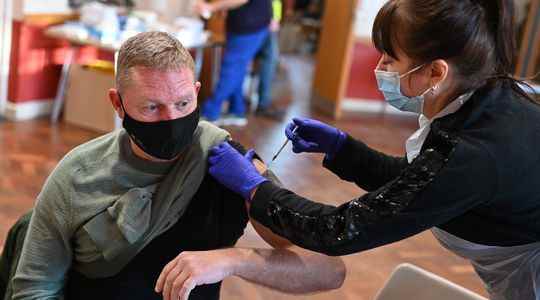It is the first country to announce it. While vaccination against Covid-19 remains very uneven around the world, Denmark is considering stopping its campaign. The country’s health authorities could suspend their entire vaccination program “no later than spring” despite a sharp increase in hospital admissions in recent days. They are due, specifies the Danish agency, to the care of patients positive for Covid-19 but for other pathologies, the number of cases having exploded with the Omicron variant. In addition to invoking good vaccination coverage (82% of the population has a complete regimencompared to 77% in France), Denmark justifies its decision by the fact that “many Danes have now, especially with the Omicron variant, been infected with Covid-19”.
Omicron and the “vaccine escape”
The fifth wave of the pandemic was marked by the advent of Omicron, considered less dangerous but more contagious than Delta, its predecessor. The circulation of this variant, very active in December and January, now seems to be declining. If “the healthcare system remains under tension”, according to its last epidemiological report, on February 10, Public Health France notes that “the slowdown in the circulation of SARS-CoV-2 has been confirmed on the territory and has been accompanied by a drop in new hospital admissions”. This is one of the data put forward by Lone Simonsen, epidemiologist at the University of Roskilde (Denmark), to legitimize the decision of his government to lift health restrictions and to stop the vaccination campaign soon. “The best indicator remains that of patients in the intensive care unit. It is very low in Denmark and continued to decrease during the Omicron wave. This is strong proof that this infection is mild in a widely vaccinated country”, did he say to Release. Specifying however that the campaign “will be ready to be reactivated if necessary during the year”.
The Omicron variant has quickly spread in the population because it has a “vaccine escape”, acquired thanks to around thirty mutations on its Spike protein, the one that allows it to enter human cells. That is, it can make vaccines less effective in protecting against infection, even though they still protect against severe forms of the disease. Several pharmaceutical companies are therefore struggling to develop a vaccine specific to the Omicron variant. Pfizer-BioNTech and Moderna announced at the end of January, within a few days, that they had started clinical trials. But an article in the scientific journal Nature tempers expectations. Published on February 14, it analyzes the first results of several studies on the effects of a special Omicron booster on animal immunity. However, after two doses of messenger RNA vaccines, it “offers no more advantages than a classic booster”, it is written.
In France, convincing again about vaccination
While waiting for the results of the tests on humans and a release on the market, while the peak of contaminations due to Omicron has passed, can the Danish example on vaccination be followed in other countries with similar indicators? France does not seem (yet) to take this direction. “Their level of vaccination is higher than ours, especially among the oldest. We still have to convince people at risk to receive their first dose or their booster. This remains our priority”, insists with the Parisian Jean-François Delfraissy, President of the Scientific Council.
“Even if the epidemic became more seasonal, like the flu, which is not said, the damage can be considerable as long as part of the population is not immunized”, abounds with L’Express the epidemiologist and president of the Covid-19 unit of the National Academy of Medicine, Yves Buisson. “Omicron has certainly affected a lot of people, but we know today that this post-infection immunity does not last very long. Coupled with a vaccination, this immunity is better, more durable.”
Are we then heading towards a fourth dose, a strategy criticized by the World Health Organization (WHO)? “Yes, for the most fragile vaccinated for six months”, explains Jean-François Delfraissy. “On the other hand, no, we will not go for a fourth generalized dose. In the immediate future, it is not worth it. But there will probably be a new vaccination campaign in October, as is the case for the flu every year. For whom? It remains to be defined,” he continues.
One more difference with the northern neighbor. The Danish National Board of Health said there was “no need at present” for a fourth dose for residents of nursing homes and older people over the age of 85. Also, the third dose is not open to those under 18. One of the reasons: “this age group already has high immunity and little risk of developing a severe form of Covid-19 with an Omicron infection”.
It remains to be seen whether other variants appear and spread in the population, forcing a review of the vaccine strategy. This does not seem to be the case in Denmark where BA.2, a sub-variant of Omicron, has become the majority among the positive cases identified each day. In France, according to Public Health France, it is slightly up, but still very much in the minority: on January 24, it represented only 5.4% of the positive cases sequenced.
